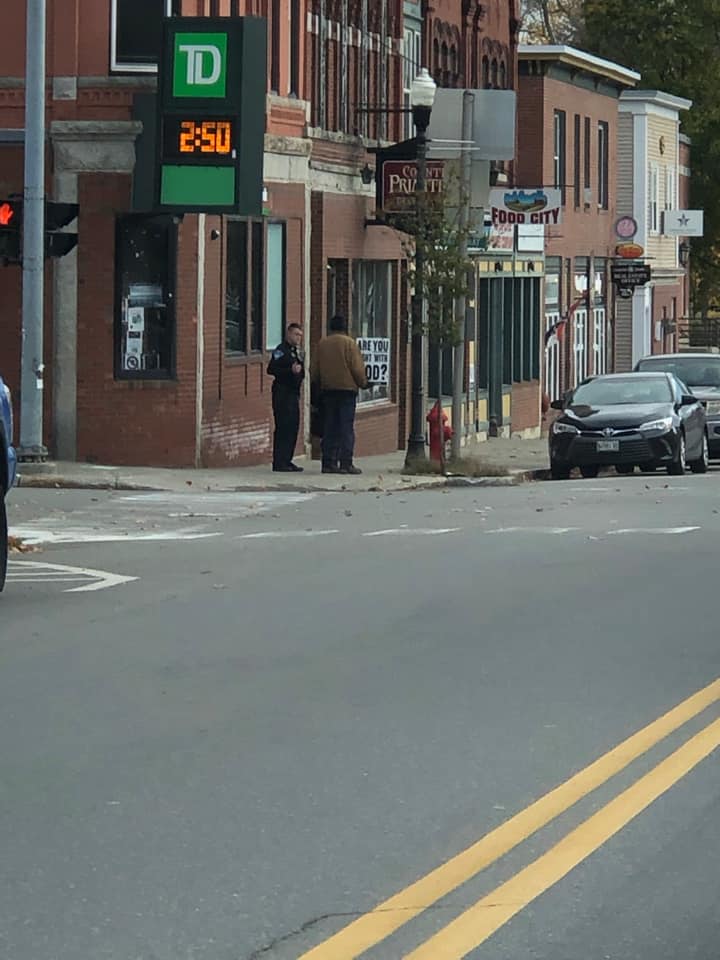
FARMINGTON – The intersection of Broadway and Main has been eerily quiet the past few weeks with the absence of a man who many had grown accustomed to seeing. The tall, middle-aged, slight man, known locally simply as “Ed,” could be found almost daily from late summer and into early winter, standing on the street corner with various signs in hand. If not downtown, Ed would take a stance at a busy crosswalk on the University of Maine campus.
Seen or not, Ed could almost always be heard.
His voice would carry, insisting that passersby were bound for hell; and while his message may have offended hundreds, Ed’s actions are protected by the very amendment that the United States is famous for.
For a small town in Maine, Farmington has a long history of people publicly proclaiming their beliefs. From the Women in Black who stand for peace in front of the post office, to the topless march in 2013, and just recently a protest that held up traffic in the name of climate change. Public protest, or speaking one’s mind, is not new to this community, and Ed has been careful to not break any laws.
But it’s complicated, and for Farmington Chief of Police Ken Charles, complaints about Ed have to be looked at carefully and individually.
“Everything is case specific. It’s multi-layered. It’s not just what the message is, it’s how it’s portrayed, and obviously the bigger concern here is the content that’s being said. I think a big piece of it is people don’t like his message…but people don’t like a lot of messages that are out there,” Charles said.
According to many people, Ed has shown a tendency of yelling louder at, or leaning in toward, anybody who doesn’t fit into his confines of “normal.” UMF staff members voiced concerned for their students who identify as LGBTQ and students of color, saying they felt as though Ed’s words crossed the line to becoming an act of harassment. Ed was issued a criminal trespass warning by campus Public Safety Director Brock Caton, and is unable to go on UMF property. However, the sidewalk where Ed carefully chooses to stand is owned by the town.
Caton said that it was determined that there was no actionable conduct, either under the criminal code or the Maine Civil Rights Act. He and others spoke with Ed about modifying his behavior, which Caton said was “largely successful.”
“What he’s doing is hateful speech, but it’s not a hate crime,” Charles explained. “Words are not illegal.”
A person is guilty of criminal threatening if he or she “intentionally or knowingly places another person in fear of imminent bodily injury,” the key word being imminent. Being told that someone is going to hell is not considered imminent, Charles said, and in fact it is simply Ed’s opinion.
Charles also said that the bulk of complaints regarding Ed were made by third party people, not by the people who were actually involved in any specific scenarios. Typically those third party complaints used the word “harassment,” he said, but even harassment doesn’t describe what Ed is doing. A person is guilty of harassment if “without reasonable cause the person engages in a course of conduct with the intent to harass, torment, or threaten another person.” The important part being the code of conduct, meaning more than twice, and targeted. The challenge there is that Ed targets everybody. And while some people have witnessed him yelling a little louder at certain people, it’s tough to identify who he might actually be targeting.
“When does our ability to just go around him trump his constitutionally protected right to free speech? If you’re working against him then you’re also working against freedom of speech,” Charles said.




